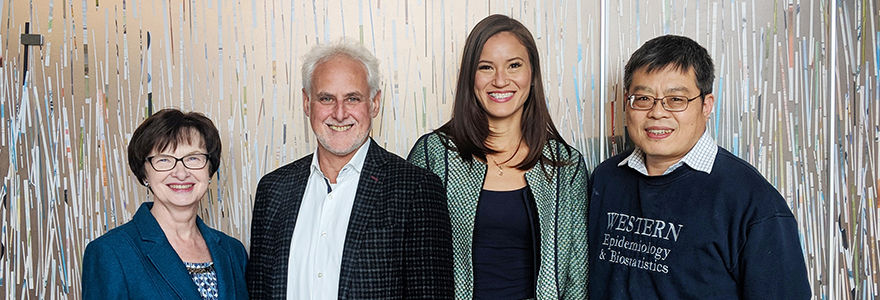The real low-down on diabetes

With the aim of improving the safety and health outcomes of people with diabetes, scientists at Schulich Medicine & Dentistry have launched a new international research initiative to develop risk prediction models for hypoglycemia (low blood sugar) — a serious and costly adverse event associated with the use of certain standard diabetes medications.
The study, Investigating Novel Predictions of Hypoglycemia Occurrence using Real-world Models (iNPHORM), has received a $1.3-million investigator-sponsored investment from Sanofi Global. The two-year, United States-based study is part of the Diabetes Alliance’s global hypoglycemia research program located at the Centre for Studies in Family Medicine. It is led by Dr. Stewart Harris, Professor in the Department of Family Medicine and Alexandria Ratzki-Leewing, a
Hypoglycemia, the most common adverse event linked to insulin and certain other diabetes medications, is one of the greatest roadblocks to achieving diabetes control.
“As it stands, we have no good way of identifying who is at risk of hypoglycemia, hampering our abilities as clinicians to provide meaningful,
Principal investigators Dr. Harris and Ratzki-Leewing, alongside co-investigators Drs. Bridget Ryan and Guangyong Zou from the Departments of Family Medicine and Epidemiology and
 The iNPHORM study is one of the first prospective, longitudinal investigations in the world to be conducted in the area of hypoglycemia. It will take place across the United States and involve 12 months of data collection using multiple self-reported, self-administered questionnaires.
The iNPHORM study is one of the first prospective, longitudinal investigations in the world to be conducted in the area of hypoglycemia. It will take place across the United States and involve 12 months of data collection using multiple self-reported, self-administered questionnaires.
“When it comes to understanding hypoglycemia in the
The questionnaires will be administered online to study participants recruited from a nationwide panel of the general public. The panel, which comprises more than 65,000 people with diabetes, is managed by Ipsos, a global leader in survey design and research. Data will be captured on participants’ experiences of non-severe and severe hypoglycemia, as well as a wide range of conventional and novel risk factors.
The iNPHORM study builds on the work of the InHypo-DM Study, a national cross-sectional investigation that revealed alarmingly high rates of hypoglycemia in Canada.
“What is clear from our research, and what is constantly reinforced in my practice, is the persistence of hypoglycemia in diabetes and the immense burden it imposes on patients, families and health care systems,” said Dr. Harris, who is also the Medical Director at the Primary Care Diabetes Support Program at St. Joseph’s Health Care London. “If we can effectively identify who is at risk and


